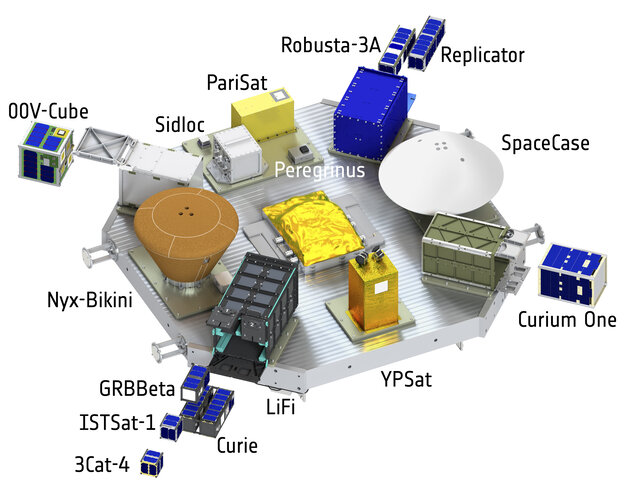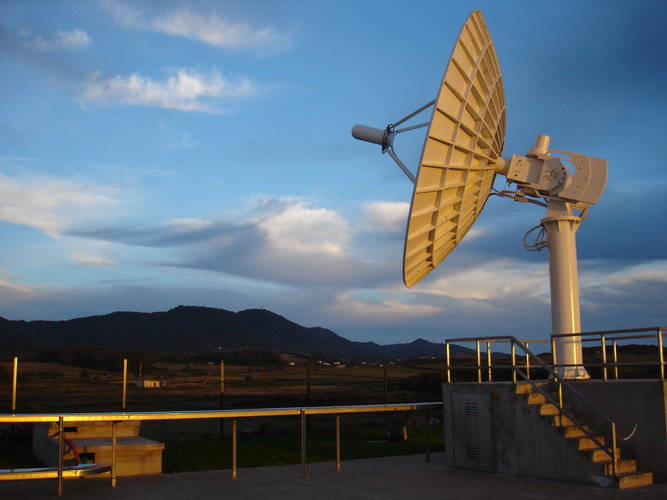HERA crew complete 45-day simulated journey to Mars
Thursday, 04 July 2024 12:32 Four dedicated explorersJason Lee, Stephanie Navarro, Shareef Al Romaithi, and Piyumi Wijesekarajust returned from a 45-day simulated journey to Mars, testing the boundaries of human endurance and teamwork within the space agencys HERA (Human Exploration Research Analog) habitat at Johnson Space Center in Houston.
Their groundbreaking work on HERAs Campaign 7 Mission 2 contributes to the s
Four dedicated explorersJason Lee, Stephanie Navarro, Shareef Al Romaithi, and Piyumi Wijesekarajust returned from a 45-day simulated journey to Mars, testing the boundaries of human endurance and teamwork within the space agencys HERA (Human Exploration Research Analog) habitat at Johnson Space Center in Houston.
Their groundbreaking work on HERAs Campaign 7 Mission 2 contributes to the s China's first commercial spacecraft launch site ready
Thursday, 04 July 2024 12:32 Hainan - China's first commercial spacecraft launch site is ready for operations in South China's Hainan province as of Sunday, having completed a rocket launch simulation rehearsal using its two launch pads.
According to the Hainan International Commercial Aerospace Launch Co Ltd (HICAL), which built and operates the launch site, the exercises performed using the launch pads included wate
Hainan - China's first commercial spacecraft launch site is ready for operations in South China's Hainan province as of Sunday, having completed a rocket launch simulation rehearsal using its two launch pads.
According to the Hainan International Commercial Aerospace Launch Co Ltd (HICAL), which built and operates the launch site, the exercises performed using the launch pads included wate NASA, Partners Conduct Fifth Asteroid Impact Exercise, Release Summary
Thursday, 04 July 2024 12:32 For the benefit of all, the space agency released a summary Thursday of the fifth biennial Planetary Defense Interagency Tabletop Exercise. the space agencys Planetary Defense Coordination Office, in partnership with FEMA (Federal Emergency Management Agency) and with the assistance of the U.S. Department of State Office of Space Affairs, convened the tabletop exercise to inform and assess our a
For the benefit of all, the space agency released a summary Thursday of the fifth biennial Planetary Defense Interagency Tabletop Exercise. the space agencys Planetary Defense Coordination Office, in partnership with FEMA (Federal Emergency Management Agency) and with the assistance of the U.S. Department of State Office of Space Affairs, convened the tabletop exercise to inform and assess our a NASA names Andre Douglas as backup Artemis II crew member
Thursday, 04 July 2024 12:32 NASA on Wednesday named Andre Douglas as a backup crewmember for its Artemis II test flight.
Douglas, a recent graduate of NASA astronaut training school, holds four post-graduate degrees. He had worked as a staff member at the Johns Hopkins University Applied Physics Laboratory where he worked on maritime robotics, planetary defense and space exploration missions for NASA.
"Andr
NASA on Wednesday named Andre Douglas as a backup crewmember for its Artemis II test flight.
Douglas, a recent graduate of NASA astronaut training school, holds four post-graduate degrees. He had worked as a staff member at the Johns Hopkins University Applied Physics Laboratory where he worked on maritime robotics, planetary defense and space exploration missions for NASA.
"Andr Moon 'swirls' could be magnetized by unseen magmas
Thursday, 04 July 2024 12:32 Lunar swirls are light-colored, sinuous features on the Moon's surface, bright enough to be visible from a backyard telescope. Some people think they look like the brushstrokes in an abstract painting. But these are not mere artistic flourishes: NASA images show that the tendrils from some lunar swirls extend for hundreds of miles.
Lunar swirls have defied easy explanation, but recent mode
Lunar swirls are light-colored, sinuous features on the Moon's surface, bright enough to be visible from a backyard telescope. Some people think they look like the brushstrokes in an abstract painting. But these are not mere artistic flourishes: NASA images show that the tendrils from some lunar swirls extend for hundreds of miles.
Lunar swirls have defied easy explanation, but recent mode iSpace lunar lander RESILIENCE achieves test milestone
Thursday, 04 July 2024 12:32 ispace, inc. (ispace)(TOKYO: 9348) report that the flight model of its HAKUTO-R Mission 2 RESILIENCE lunar lander has successfully completed thermal vacuum testing and remains on schedule for a Winter 2024 launch.
The testing was completed at the Japan Aerospace Exploration Agency (JAXA) Tsukuba Space Center in Tsukuba, Japan, where the agency operates a large testing facility. The flight
ispace, inc. (ispace)(TOKYO: 9348) report that the flight model of its HAKUTO-R Mission 2 RESILIENCE lunar lander has successfully completed thermal vacuum testing and remains on schedule for a Winter 2024 launch.
The testing was completed at the Japan Aerospace Exploration Agency (JAXA) Tsukuba Space Center in Tsukuba, Japan, where the agency operates a large testing facility. The flight Behind the Scenes of a NASA 'Moonwalk' in the Arizona Desert
Thursday, 04 July 2024 12:32 NASA astronauts Kate Rubins and Andre Douglas recently performed four moonwalk simulations to help NASA prepare for its Artemis III mission. Due to launch in September 2026, Artemis III will land two, yet-to-be-selected, astronauts at the Moon's South Pole for the first time.
Traveling to space requires immense preparation, not just for the astronauts, but for the hundreds of people who wo
NASA astronauts Kate Rubins and Andre Douglas recently performed four moonwalk simulations to help NASA prepare for its Artemis III mission. Due to launch in September 2026, Artemis III will land two, yet-to-be-selected, astronauts at the Moon's South Pole for the first time.
Traveling to space requires immense preparation, not just for the astronauts, but for the hundreds of people who wo Eye test for lunar impact surveyor
Thursday, 04 July 2024 10:26 Image:
Eye test for lunar impact surveyor
Image:
Eye test for lunar impact surveyor Ariane 6 first passengers – with names
Thursday, 04 July 2024 10:15 Image:
Ariane 6 first passengers – with names
Image:
Ariane 6 first passengers – with names Ariane 6 first passengers
Thursday, 04 July 2024 10:15 Image:
Ariane 6 first passengers
Image:
Ariane 6 first passengers A new set of studies offers the most comprehensive look at spaceflight health since NASA's Twins Study
Thursday, 04 July 2024 10:04Only about 600 people have ever traveled to space. The vast majority of astronauts over the past six decades have been middle-aged men on short-duration missions of fewer than 20 days.
Today, with private, commercial and multinational spaceflight providers and flyers entering the market, we are witnessing a new era of human spaceflight. Missions have ranged from minutes, hours and days to months.
As humanity looks ahead to returning to the moon over the coming decade, space exploration missions will be much longer, with many more space travelers and even space tourists. This also means that a wider diversity of people will experience the extreme environment of space—more women and people of different ethnicities, ages and health status.
Since people respond differently to the unique stressors and exposures of space, researchers in space health, like me, seek to better understand the human health effects of spaceflight.
To guard against cyberattacks in space, researchers ask 'what if?'
Thursday, 04 July 2024 09:44
If space systems such as GPS were hacked and knocked offline, much of the world would instantly be returned to the communications and navigation technologies of the 1950s. Yet space cybersecurity is largely invisible to the public at a time of heightened geopolitical tensions.
Cyberattacks on satellites have occurred since the 1980s, but the global wake-up alarm went off only a couple of years ago. An hour before Russia's invasion of Ukraine on Feb. 24, 2022, its government operatives hacked Viasat's satellite-internet services to cut off communications and create confusion in Ukraine.
I study ethics and emerging technologies and serve as an adviser to the U.S. National Space Council. My colleagues and I at California Polytechnic State University's Ethics + Emerging Sciences Group released a U.S. National Science Foundation-funded report on June 17, 2024, to explain the problem of cyberattacks in space and help anticipate novel and surprising scenarios.
Space and you
Most people are unaware of the crucial role that space systems play in their daily lives, never mind military conflicts.
Laser upgrade for Mars rover
Thursday, 04 July 2024 09:34 Image:
Laser upgrade for Mars rover
Image:
Laser upgrade for Mars rover Tracking Ariane 6 as it soars over the Azores
Thursday, 04 July 2024 06:00
A network of ground stations around the world, including two owned by ESA, will track the debut flight of Europe’s new Ariane 6 rocket. They will monitor key phases of the flight and gather telemetry and video that will be used to analyse the rocket’s performance and optimise future launches.
Firefly Aerospace aims to launch eight CubeSat satellites after scrub
Wednesday, 03 July 2024 21:38 Firefly Aerospace will try to get its Alpha rocket carrying eight CubeSat satellites into space on Tuesday night from California's Vandenberg Space Force Base after the mission was scrubbed on Monday.
The satellites are being put into space under NASA's Launch Services Program Venture. Officials blamed a "last minute" ground systems issues led to the mission's pause on Monday.
"O
Firefly Aerospace will try to get its Alpha rocket carrying eight CubeSat satellites into space on Tuesday night from California's Vandenberg Space Force Base after the mission was scrubbed on Monday.
The satellites are being put into space under NASA's Launch Services Program Venture. Officials blamed a "last minute" ground systems issues led to the mission's pause on Monday.
"O 

